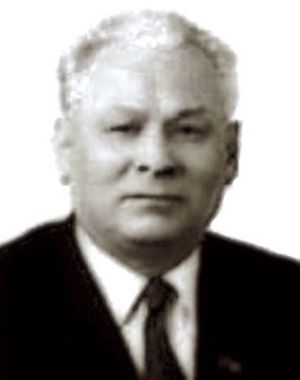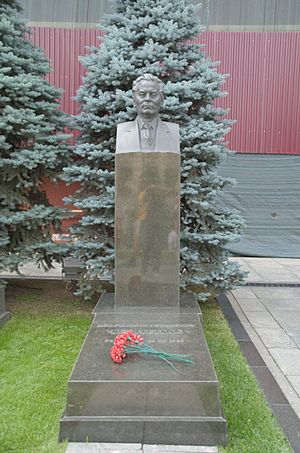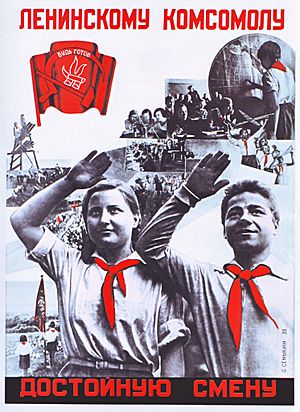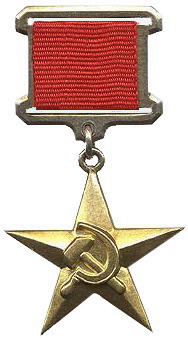Konstantin Chernenko facts for kids
Quick facts for kids
Konstantin Chernenko
|
|
|---|---|
 |
|
| General Secretary of the Communist Party of the Soviet Union | |
| In office 13 February 1984 – 10 March 1985 |
|
| Preceded by | Yuri Andropov |
| Succeeded by | Mikhail Gorbachev |
| Chairman of the Presidium of the Supreme Soviet |
|
| In office 11 April 1984 – 10 March 1985 |
|
| Preceded by | Yuri Andropov |
| Succeeded by | Andrei Gromyko |
| Second Secretary of the Communist Party of the Soviet Union | |
| In office 10 November 1982 – 9 February 1984 |
|
| Preceded by | Yuri Andropov |
| Succeeded by | Mikhail Gorbachev (de facto) |
| In office 25 January 1982 – 24 May 1982 (Acting) |
|
| Preceded by | Mikhail Suslov |
| Succeeded by | Yuri Andropov |
| Personal details | |
| Born |
Konstantin Ustinovich Chernenko
24 September 1911 Bolshaya Tes, Yeniseysk Governorate, Russian Empire |
| Died | 10 March 1985 (aged 73) Moscow, Russian SFSR, Soviet Union |
| Cause of death | Emphysema and heart failure |
| Resting place | Kremlin Wall Necropolis, Moscow, Russian Federation |
| Citizenship | Soviet |
| Nationality | Ukrainian |
| Political party | Communist Party of the Soviet Union |
| Spouses | Faina Vassilyevna Chernenko Anna Dmitrievna Lyubimova
(m. 1944) |
| Children | Albert Chernenko Vera Chernenko Yelena Chernenko Vladimir Chernenko |
| Awards | |
| Signature |  |
| Military service | |
| Allegiance | Soviet Union |
| Branch/service | Soviet Armed Forces |
| Years of service | 1930-1933 |
Konstantin Ustinovich Chernenko (born September 24, 1911 – died March 10, 1985) was a Soviet politician. He became the fifth leader of the Communist Party of the Soviet Union. He led the Soviet Union from February 13, 1984, until his death about a year later. Chernenko was also the Chairman of the Presidium of the Supreme Soviet, which was a top government role.
Contents
Early Life and Political Start
Konstantin Chernenko was born into a poor family. This was in a Siberian village called Bolshaya Tes. His father worked in mines, and his mother took care of their farm.
In 1929, Chernenko joined the Komsomol. This was a youth group for young communists. By 1931, he became a full member of the Communist Party. From 1930 to 1933, he served in the Soviet Border Troops. He worked as a guard on the border between the Soviet Union and China.
After his military service, he returned to Krasnoyarsk. There, he worked as a propagandist. This meant he helped spread the ideas of the Communist Party. He slowly moved up in the Party. He became the head of different departments. In 1945, he earned a diploma from a party training school in Moscow.
A very important moment in Chernenko's career happened in 1948. He was put in charge of the Communist Party's propaganda in Moldavia. There, he met Leonid Brezhnev. Brezhnev was a powerful leader who would later lead the Soviet Union. Chernenko and Brezhnev became close. Chernenko followed Brezhnev to Moscow in 1956. He took on a similar propaganda job. In 1960, when Brezhnev became head of state, Chernenko became his chief of staff.
Later Life and Death

Konstantin Chernenko had serious health problems for a long time. These problems got worse before he became the leader. In 1983, he was away from his duties for three months because of illness.
In early 1984, Chernenko was in the hospital for over a month. But he still tried to work from his hospital bed. During the summer, his doctors sent him to a health resort. However, his health got worse there. He did not return to the Kremlin until later in 1984. He was so unwell that he needed a wheelchair to move around his office.
By the end of 1984, Chernenko could barely leave the hospital. His illness was publicly announced in February 1985. His health continued to decline quickly. On March 10, 1985, Chernenko passed away. He was 73 years old.
Chernenko was the third Soviet leader to die in less than three years. When U.S. President Ronald Reagan heard the news, he famously said, "How am I supposed to get anyplace with the Russians if they keep dying on me?"
Chernenko was given a state funeral. He was buried in the Kremlin Wall Necropolis in Moscow. He was the last person to be buried there.
Honors and Awards
Chernenko received many awards during his life. These awards recognized his work for the Soviet Union. Some of his most important honors include:
- Hero of Socialist Labour, three times
- Order of Lenin, four times
- Order of the Red Banner of Labour, three times
- Medal "For Valiant Labour in the Great Patriotic War 1941–1945"
- Lenin Prize in 1982
- USSR State Prize in 1982
- Order of Karl Marx from East Germany
- Order of Georgi Dimitrov from Bulgaria
- Order of Klement Gottwald from Czechoslovakia
Images for kids
-
Chernenko at the platform of Lenin's Mausoleum
See also
 In Spanish: Konstantín Chernenko para niños
In Spanish: Konstantín Chernenko para niños
 | Jewel Prestage |
 | Ella Baker |
 | Fannie Lou Hamer |




